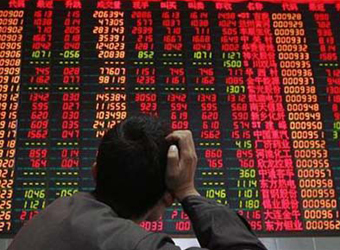Japan’s Nikkei 225 declined 0.56 percent, but was off its session lows. The broader Topix slipped 0.29 percent, with oil and gas the worst-performing sector index.
Tech shares traded lower, with semiconductor-related plays underperforming the broader market. Tokyo Electron and Renesas Electron slid 1.34 percent and 8.42 percent, respectively.
Over in South Korea, the Kospi slid 0.58 percent as technology stocks weighed on the broader index, taking cues from the declines on Wall Street. Samsung Electronics fell 1.9 percent.
The Hang Seng Index edged down by 0.6 percent as property developers and tech stocks came under pressure. On the mainland, the Shanghai composite lost 0.93 percent and the Shenzhen composite eased 1.07 percent.
Down Under, the S&P/ASX 200 hovered around the flat line, with the index inching 0.02 percent higher. Losses in industrials were offset by gains in the energy and materials subindexes. Gold producers also climbed.
On Monday, the Dow Jones industrial average fell 1.9 percent. Meanwhile, the S&P 500 sank 2.23 percent — re-entering correction territory and closing below its 200-day moving average for the first time since June 2016.
The Nasdaq composite lost 2.74 percent, closing in correction territory for the first time.
Shares of U.S. tech giants, including Facebook, Netflix and Google parent Alphabet, all declined overnight in the first trading session of the month, having first sold off in March.
E-commerce giant Amazon, one of the best performers over the past year, declined after U.S. President Donald Trump criticized the company in a series of tweets.
Investors also digested China’s announcement that it was imposing tariffs on 128 kinds of U.S. products, beginning Monday, in response to U.S. duties on steel and aluminum imports unveiled last month. Beijing said in March that those products had an import value of $3 billion in 2017.
Analysts saw the move as largely measured, although there was concern that retaliation from U.S. trading partners would be negative for global economic growth and corporate profits.
“The question about trade policy is whether it affects second-quarter, third-quarter, fourth-quarter [earnings]. The market really is now discounting earnings growth potential based on potential trade wars,” James Norman, head of equity strategy at QS Investors, told CNBC’s “Squawk Box.”
In corporate news, Australian oil and gas company Santos announced Tuesday that it had received a $10.4 billion takeover proposal from Harbour Energy, Reuters said. Santos stock was up 16.27 percent.
Elsewhere, South Korea’s SK Innovation was down 1.64 percent. Reuters reported that the company said on Monday it intended to sell shares in its SK Lubricants unit as part of a planned initial public offering.
Meanwhile, shares of Kumho Tire surged 27.88 percent after news that the plan to sell a majority stake in the company to Qingdao Doublestar was approved by union workers on Monday.
The dollar index, which tracks the U.S. currency against six peers, stood at 89.994 by 12:32 p.m. HK/SIN.
Against the yen, the dollar drifted higher but remained below the 106 level. The dollar last traded at 105.96 after slipping against the safe-haven Japanese currency for the third straight session on Monday.
On the economic front, the Reserve Bank of Australia kept the cash rate steady at 1.5 percent on Tuesday, as was widely expected by markets.
Source: CNBC

